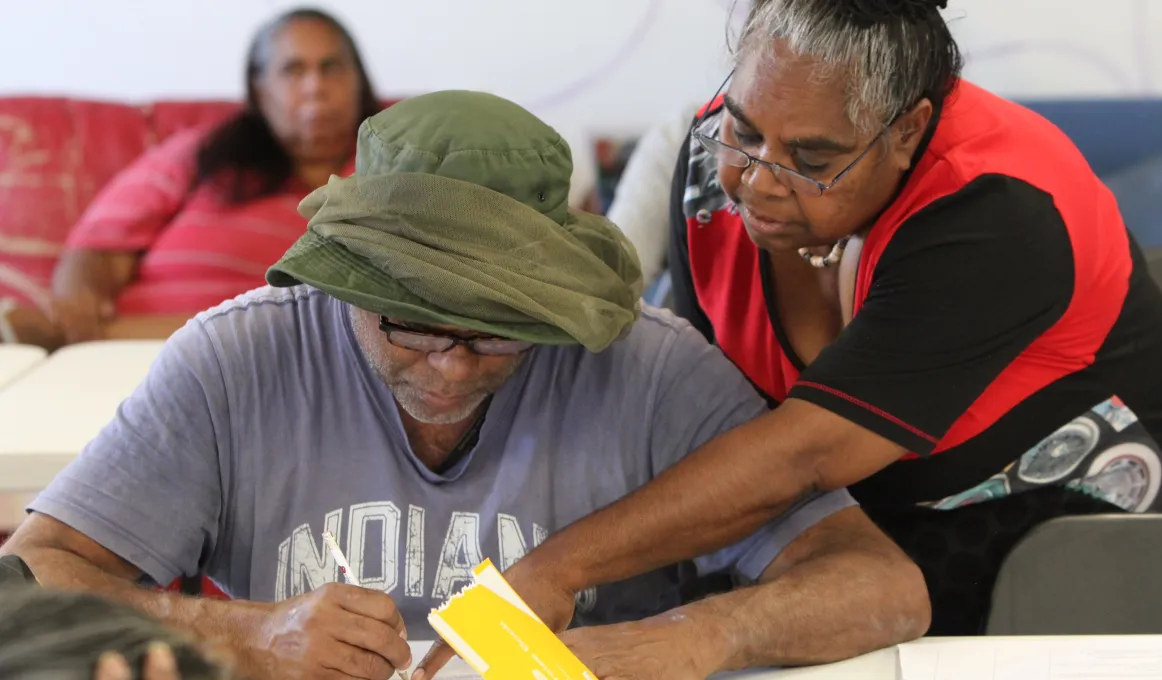Increasing adult literacy in Brewarrina, NSW

Indigenous Literacy Day is a day we celebrate Indigenous culture and focus on adult literacy rates in Indigenous communities. In the Western NSW communities of Brewarrina and Walgett, an adult literacy campaign has led to improved literacy rates and increased employment opportunities, confidence and self-esteem.
The ability to read and write is essential to taking full advantage of all that society has to offer. It enables a person to expand their knowledge and gives them the skills needed to get information and fill in essential forms.
Indigenous Literacy Day reminds us of this important principle. It is a celebration of Indigenous culture, stories and language. But it is also a chance to focus on literacy levels amongst Aboriginal and Torres Strait Islander peoples.
Mary Waites is an Aboriginal Coordinator for the Literacy for Life Foundation (LFLF) in Brewarrina, NSW. She works on the Aboriginal adult literacy campaign known as Yes, I Can!
“My responsibility is to go out and motivate my people to come to the classes,” Mary said.
“I make sure they are all safe, happy and comfortable to learn to read and write.”
The campaign is based on the ‘ripple effect’ which means that if parents can read, and in fact read to their children, then the children will also see the value in learning to read and write.
The six-month course requires students to watch 64 DVDs in the classroom followed by hands on activities such as using computers, cultural excursions and doing their family tree.
“The course is very successful,” Mary said.
“We see students being more empowered, going for jobs, getting their driver’s license and doing their own resume on the computer.”
Mary also said that she is seeing other changes come over the students. Their confidence increases along with their self-esteem as they learn about their rights. They are happy, free, and comfortable and return to the classes because they want to learn more.
“There is a young bloke, 20 years old, a student from Intake 3 who is now a facilitator at the front of the class teaching his mob,” Mary said.
“I see another young student working as an actor on a film, who first came into the class a very shy person who hardly ever spoke. To see my people being empowered and proud is all worth it.”
The Cuban developed campaign has been running since 2012 in Western New South Wales. Local Aboriginal leaders run the campaign, while supported by a small team from the LFLF. The campaign has been run in eight communities and enjoys completion rates over 65%, which is well above other formal accredited literacy courses.
Find out more
Improving levels of literacy among Aboriginal and Torres Strait Islander communities is a high priority for the Australian Government.
The Department of the Prime Minister and Cabinet (PM&C) funded the LFLF through the Children and Schooling Programme and the Jobs, Land and Economy programme to deliver an adult literacy programme in Brewarrina and Walgett until March 2018.
For more information, go to Literacy for Life Foundation and Indigenous Literacy Day.